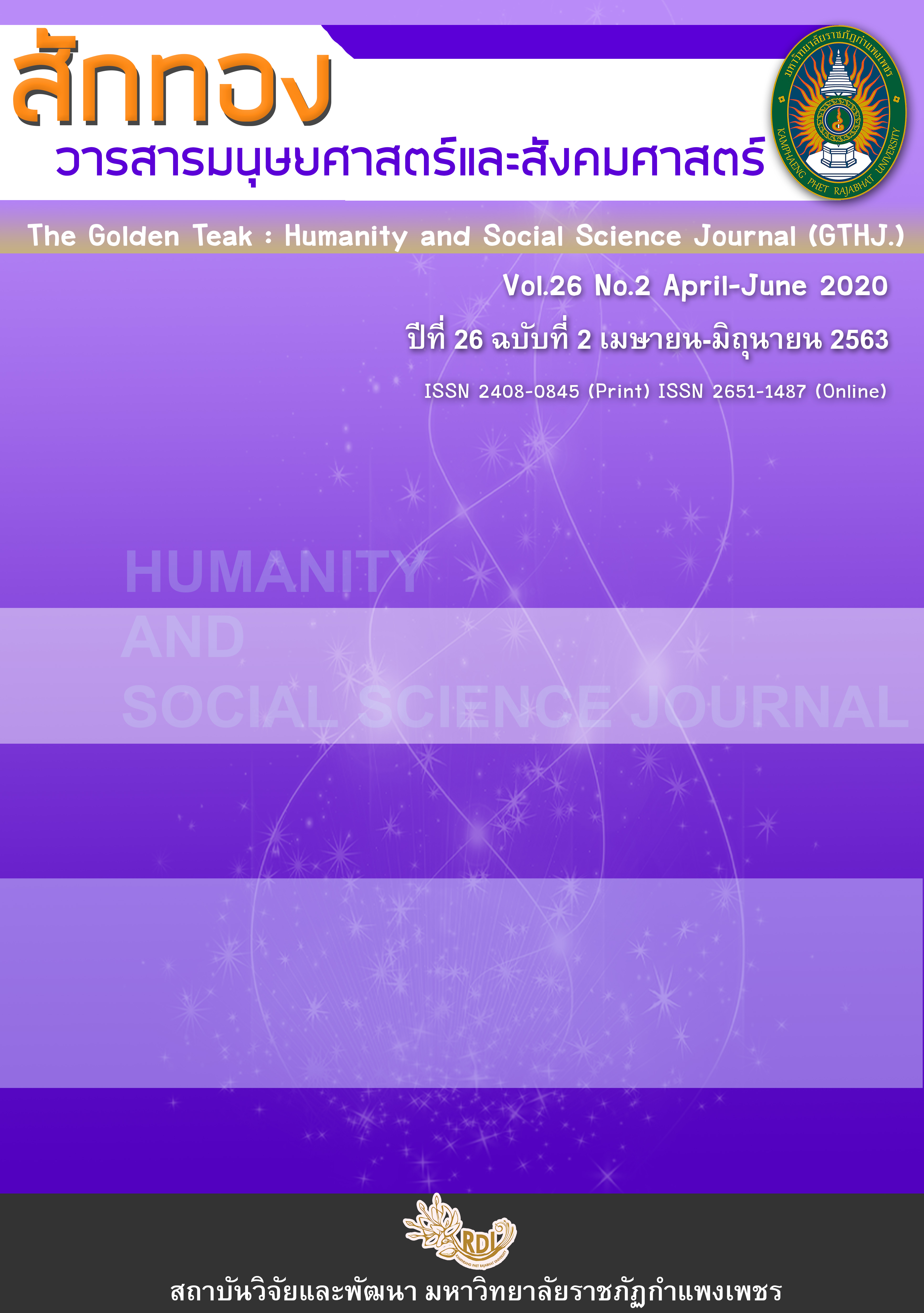The Development of an Instructional Model Based on Digital Storytelling to Enhance English Pronunciation and Creativity of Undergraduate Students
Main Article Content
Abstract
The objectives of this research were 1) to develop an instructional model based on digital storytelling to enhance English pronunciation and creativity of undergraduate students 2) to study the effectiveness of the developed instructional model. Samples were 30 students from the Elementary Program of Faculty of Education, Kampaeng Phet Rajabhat University, who enrolled in the Introduction to Linguistic for Elementary School Teachers in the 1st semester of academic year 2018. Research instruments included the English pronunciation test, the creativity evaluation form, and the students’ satisfaction questionnaire. Data were analyzed using mean score, standard deviation, t-test for dependent sample, relative gain score and content analysis. The findings were as follows: 1. The instructional model based on digital storytelling to enhance English pronunciation and creativity of undergraduate students consists of 5 components: 1) principle, 2) objectives, 3) content, 4) procedures and 5) evaluation 5 procedures which were perceiving problems, searching from media, working together, creating a product and coordinating ideas;. 2.1) The effectiveness of the developed instructional model found that the students’ posttest average scores of the English pronunciation were significantly higher than the pretest mean scores at the .05 level 2.2) The relative gain scores of creativity was higher than the designated standard of 60 percent. The mean scores of creativity ranging from the highest to the lowest were fluency, elaboration, originality and flexibility. 2.3) The overall scores of the student satisfaction toward the developed instructional model was at the high level. The mean scores of students’ satisfaction ranging from the highest to the lowest were Instructor, Content, Digital Storytelling Product, Learning Process and Environment.
Article Details
บทความที่ได้รับการตีพิมพ์เป็นลิขสิทธิ์ของวารสาร สักทอง : วารสารมนุษยศาสตร์และสังคมศาสตร์ สถาบันวิจัยและพัฒนา มหาวิทยาลับราชภัฏกำแพงเพชร
ข้อคิดเห็นใดๆ ที่ปรากฎในวารสารเป็นวรรณกรรมของผู้เขียนโดยเฉพาะ ซึ่งมหาวิทยาลัยราชภัฏกำแพงเพชรและบรรณาธิการไม่จำเป็นต้องเห็นด้วย
References
Chatwirote, B. (2018, January-April). The Development of Training Course on Phonetics for
Primary Teachers to Enhance Teaching Abilities in Pronunciation and
Vocabulary Spelling English for Ethnic Diversity Students in the Special
Economic Zone along Thailand and Myanmar Border. The Golden Teak :
Humanity and Social Science Journal, 24(1), 92-106.
Chotiksatein, P. (2009). Vowels and Consonants Pronunciation of English. (8 th ed.).
Bangkok : Chulalongkorn Publishing.
Hewings, M. (2004). Pronunciation tasks. Student’s Book. Cambridge : Cambridge University
Press.
Laddaklom Booncherdchoo, S. (2016, May-August). The Development of Creative Thinking
Ability of Undergraduate Students in Early Childhood Education Program through
Self-Regulation Learning Process Approach. Veridian E-Journal, Silpakorn
University, 9(2).
Li (2005). Translated English of Chinese standard. [Online]. Available :
https://books.google.co.th [2016, May 10].
Ministy of Education. (2008). Basic Education Core Curriculum. Bangkok : Kurusapa Publishing.
Mishra, & Koehler. (2006). Contemporary literacies and technologies in english language
arts teacher education : Shift happens. [Online]. Available : https://www.punyamishra.com/2008/01/12/mishra- koehler-2006/ [2016, May 10].
Nakniyom, J. (2010). Creativity Thinking of Chulalongkorn Medical Students. Master thesis,
Graduate School, Chulalongkorn University.
Robin, B., & Pierson, M. (2005). A Multi level approach to using digital storytelling in the
classroom. Digital Storytelling Workshop, SITE 2005, University of HUSTON.
[Online]. Available : http://digitalstorytelling. coe.uh.edu/survey/SITE_Digital
Storytelling.pdf. [2016, May 10].
Samakoses, V. (2015). The crisis of English teacher in Thai Education in Post Today [Online].
Available : https://www.posttoday.com/politic/report/402500. [2017, January 6].
Sinlarat, P. (2016). Creative and Productive Education Philosophy. Bangkok : Chulalongkorn
Publishing.
Smeda, et al. (2014). The effectiveness of digital storytelling in the classrooms: a
comprehensive study. Smart Learning Environments. [Online]. Available :
https://slejournal.springeropen.com/articles/10.1186/s40561-014-0006-3
[2016, May 10].
Tauycharean, P. (2001) Phonetic English Speaking. (3 rd ed.). Bangkok : Thummasat
Publishing.
The Digital Storytelling Association. (2002). The center for digital storytelling. [Online].
Available : http://dsaweb.org [2016, January 24].
Wright, C. (2013). English is fun by Chris. Bangkok : Se-ed Publishing.


